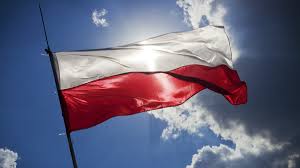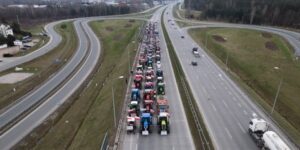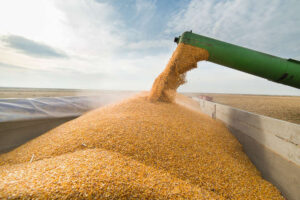
Slovakia will hold a series of talks starting next week to secure gas supplies from Russia after its current transit contract, which involves Ukraine, expires at the end of this year, Reuters reported on Friday, citing government officials.
“In the coming days, in particular during the Christmas holidays, you can witness extremely intense negotiations at different levels and in different countries, which will begin next week,” Slovak Prime Minister Robert Fico said at a press conference.
Denisa Sakova, Deputy Prime Minister and Minister of Economy of Slovakia, said that the talks would involve the European Commission, Ukraine and EU member states.
Fico said that he sought to ensure the continuation of supplies from the east to avoid additional fees for gas transit from other directions. “We see no reason to pay more for gas than necessary for geopolitical reasons… I believe that even if there is a short-term interruption of supplies from the east, we have enough reserves to find a common solution for several EU countries, and we will keep gas transit through Slovakia, as well as gas transit through Ukraine,” he said.
Reuters notes that Slovak officials have been looking for alternative gas transit schemes through Ukraine that would not require a direct agreement between Ukraine and Russia, but have not reached any agreement.
Slovakia reportedly has a long-term contract with Russia’s Gazprom and would like to keep importing Russian gas through Ukraine, but it will end at the end of 2024, as Ukraine does not plan to extend the transit contract with Gazprom.
Earlier, Hungarian Foreign Minister Péter Szijjártó said that Hungary and Bulgaria had found a legal and financial solution acceptable to the parties to continue the transit of Russian gas through their countries in the face of US sanctions against Gazprombank.
Hungary receives Russian gas through the Turkish Stream pipeline from Russia to Turkey and then transits through Bulgaria to Hungary. Hungary has received the bulk of its gas consumption through this route – this year, more than 7 billion cubic meters.
At the same time, Bloomberg, citing the Bulgarian Ministry of Energy, reports that “only a ‘solution’ to the problem was discussed, which would include Hungary and allow Bulgaria to continue receiving transit fees after the arrival of Russian gas.” Bulgaria has previously warned that it may stop transiting Russian gas to Central Europe if Gazprom does not find a payment solution, the agency reminds.

European Commissioner for Energy Kadri Simson says the European Union is ready to completely stop the transit of Russian gas through the Ukrainian gas transportation system after the expiration of the current contract in December this year.
“When I spoke with my colleagues in Ukraine, I made it clear that we are preparing for a situation where the transit agreement between Ukraine and Russia will expire by the end of this December. We have found alternative supply routes, and the Member States or their companies that are still receiving gas from Russia have in fact been granted two additional years compared to other companies that Russia has decided to stop supplying to in 2022,” the European Commissioner said at a press conference in Brussels on Wednesday.
At the same time, Simson stated that Ukraine’s gas transportation infrastructure is also part of the EU’s infrastructure, as part of the European gas is stored in Ukraine’s storage facilities, “which provide us with additional capacity.”
“Ukraine is also a gas producer, so we have to make sure that their infrastructure still has value. But my message is very clear: there is no need to look for any new ways to continue trading with Gazprom. Alternative supplies are available, and we are engaging with affected member states to show them that alternative routes will deliver the volumes they need,” she elaborated.
Simson also referred to the words of Ukrainian President Volodymyr Zelenskyy, who said in late August that “Ukraine is not interested in extending the transit contract with Russia, and that European companies have the right to use Ukrainian infrastructure.”
According to the European Commissioner, her “main mission is to encourage companies that are still receiving Russian pipeline gas because they had contracts signed before the war to choose more predictable alternatives.”
Simson also cited figures showing that the share of Russian gas in EU imports fell from 45% in 2021 to 18% by June 2024, while imports from reliable partners such as Norway and the United States increased. In addition, the EU reduced gas demand by 138 billion cubic meters between August 2022 and May 2024.
“The EU reached its 90% winter gas storage target on August 19, 2024, well ahead of the November 1 deadline, and energy prices are more stable and remain well below the peak levels of the 2022 energy crisis,” she elaborated.

It is advisable for Poland to maintain the blockade on Ukrainian grain imports, but transit should be allowed when transshipment capacities are free in Polish ports, President of the Grain and Feed Chamber of Poland Monika Pątkowska said in an interview with farmer.pl.
“Today it would be better if the blockade of grain imports is maintained, and when it comes to transit, we could implement it to some extent and thus help Ukraine when we have free handling capacities in Polish ports,” she said.
Pętkowska noted that Polish ports were not 100% loaded in the first quarter of 2024.
“We have to conclude that our port infrastructure, but also the railroad infrastructure is inefficient. Now is the right time to expand it. I believe that we slept through the last two years in this context. Romania has received funds from the European Union and is expanding its infrastructure, while Poland has not done it so far,” the public figure emphasized.
She is sure that Poland should show both Ukraine and the international community that it wants to help effectively but, on the other hand, firmly protects the interests of the Polish farmer. These two goals, in her opinion, should be combined.
“The sooner we come to a mutual understanding, the sooner we develop mechanisms, the less complicated will be the atmosphere that may hinder our broader cooperation not only with Ukraine, but also in the European arena,” summarized the president of the Polish Grain Chamber.

The number of completed movements from Ukraine under the general transit procedure (NCTS) in the first quarter of this year amounted to 19 thousand, which is 13 times more than in the same period last year, the State Customs Service of Ukraine reported on Monday.
“Despite the hostilities and the difficult situation on the western border of Ukraine, the first quarter of 2024 was the most productive by all accounts compared to previous quarters since the start of the application of the common transit procedure (NCTS) in Ukraine, that is, from October 1, 2022,” the agency said in a statement on its Telegram channel.
It is specified that during January-March 2024, a third of the total number of transit declarations under the NCTS was issued – 23.5 thousand out of more than 65 thousand. In particular, in the countries participating in the NCTS Convention, more than 19 thousand movements initiated by the customs authorities of Ukraine were successfully completed, while in Ukraine – almost 4.5 thousand movements initiated in other countries participating in the Convention.
The customs office emphasized that compared to the same period last year, i.e. the first quarter of 2023, the rate of successfully completed movements started in Ukraine increased 13 times, and movements started in other countries party to the Convention – 9 times.
Also, in January-March 2024, the number of companies that received and use authorizations for the application of transit simplifications in accordance with the Convention almost doubled from 57 to 101.
It is specified that they have been granted 121 authorizations (out of 303 during the period of application of the Convention by Ukraine), 39 of which were granted to use the general guarantee (including an increase in the reference amount), 27 each with the status of authorized shipper and consignee, and 22 to use special type seals.
Regarding the guarantee of the joint transit procedure, the State Customs Service notes a significant increase in the number of registered individual guarantees in the first quarter of 2024.
“In this quarter alone, almost 3 thousand individual guarantees worth more than EUR 95 million were registered. At the same time, since Ukraine joined the Convention on the Common Transit Procedure, at the end of the quarter, almost 5.5 thousand valid (including used) individual guarantees totaling EUR 274 million were available in the NCTS system,” the service added.
In addition, during this period, 21 general guarantees worth EUR 38 million were registered. Since the start of the NCTS system, only 74 general guarantees have been registered, 50 of which are currently valid for EUR 167 million.
Earlier, roundtables were devoted to customs reform, where the event’s organizer and moderator Maksim Urakin stated that the State Customs Service accounts for 35-40% of state budget revenues, and these figures have remained stable in recent years. That is why customs reforms are so important for the country.m

Ukrainian and Polish agrarian associations will continue negotiations this week on the transit of grain and other products and the unblocking of the border, said Taras Vysotskyi, First Deputy Minister of Agrarian Policy and Food of Ukraine, during a national telethon.
“It is very important that the associations of different sectors have established communication and will continue to meet this week to clearly agree on the parameters (of export and transit of Ukrainian agricultural products – IF-U). Everyone realized (at the Ukrainian-Polish meeting in Poland last week – IF-U) that interaction and cooperation, agreements will ultimately have the best result,” he said.
According to Vysotsky, in the first two weeks of April, a meeting of the Polish and Ukrainian sides is planned in an expanded format, where farmers of the two countries will look for ways to cooperate. It is expected that this could also become the basis for agreements at the interstate level. Agrarian associations will work on each industry whose representatives were at the talks, including raspberries, juice, honey, eggs, grain, and poultry.
“There is a cautious optimism in this regard, which gives us hope that after a few more meetings to fix the final parameters, we will finally be able to solve this problem,” Vysotsky emphasized.
He also added that the issue of transit of Ukrainian grain is raised at all international meetings.
“Ukraine insists that transit should be available without stops and blockages,” the First Deputy Minister summarized.
agrarian associations, AGRICULTURAL PRODUCTS, BORDER, TRANSIT

In July-September this year, the cargo turnover of the port of Kolobrzeg increased by 52% due to the resumption of transshipment of Ukrainian agricultural products, the Polish edition of Rynek Infrastruktury reports.
According to the report, Kolobrzeg was not previously included in the Polish government’s resolution on the transit of Ukrainian grain. In the third quarter, the port resumed accepting Ukrainian agricultural products, which helped increase cargo turnover.
In the third quarter, the Polish port handled more than 73 thousand tons of cargo, which is 52% more than in the same period of 2022, when 48 thousand tons were handled. The cargo included grain, logs, limestone, pellets and fertilizers. Grain accounts for half of the transshipment. Among the grains transshipped in Kolobrzeg, corn and barley were the most common.
The port temporarily suspended operations in April this year. Back then, the Polish authorities banned imports of Ukrainian grain but allowed its transit. At first, Kolobrzeg was not on the list of ports that could handle Ukrainian grain, but later the Polish government allowed the company to handle Ukrainian cargo.
“We have demonstrated that we are unpredictable in our actions as a country, so building long-term business relations is perceived as risky, as one decree can turn everything upside down”, said Artur Lievski, head of the port’s administration.
A week after the ban was imposed by the Polish government, the mistake was corrected: Kolobrzeg was included in the list of seaports through which grain can be transited from Ukraine. However, it took a long time to restore trust, and for some time no freight trains with Ukrainian products arrived in Kolobrzeg. After a three-month break, the first train with corn from Ukraine arrived at the seaport of Kolobrzeg in late July, the newspaper said.